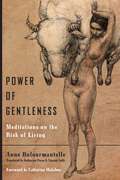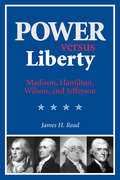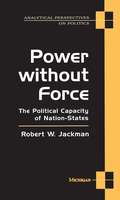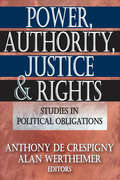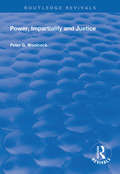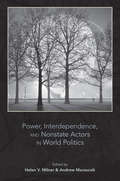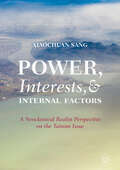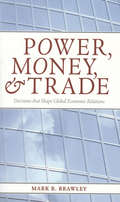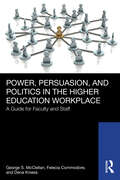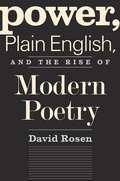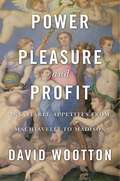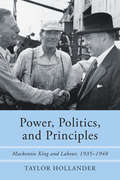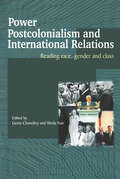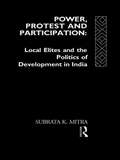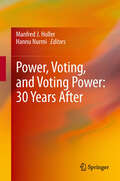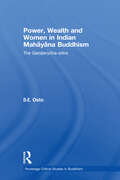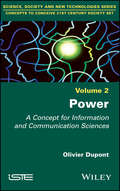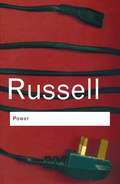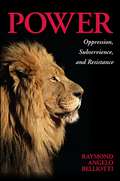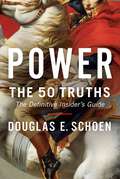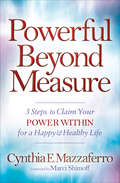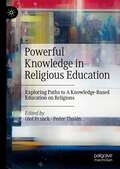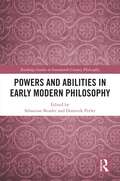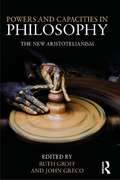- Table View
- List View
Power of Gentleness: Meditations on the Risk of Living
by Anne DufourmantelleGentleness is an enigma. Taken up in a double movement of welcoming and giving, it appears on the threshold of passages signed off by birth and death. Because it has its degrees of intensity, because it is a symbolic force, and because it has a transformative ability over things and beings, it is a power. The simplicity of gentleness is misleading. It is an active passivity that may become an extraordinary force of symbolic resistance and, as such, become central to both ethics and politics. Gentleness is a force of secret life-giving transformation linked to what the ancients called potentiality.In our day, gentleness is sold to us under its related form of diluted mawkishness. By infantilizing it our era denies it. This is how we try to overcome the high demands of its subtlety—no longer by fighting it, but by enfeebling it. Language itself is therefore perverted: what our society intends to give the human beings that it crushes “gently,” it does in the name of the highest values: happiness, truth, security.From listening to those who come to me and confide their despair, I have heard it expressed in every lived experience. I have felt its force of resistance and its intangible magic. In mediating its relation to the world, it appears that its intelligence carries life, saves and amplifies it.
Power versus Liberty: Madison, Hamilton, Wilson, and Jefferson
by James H. ReadDoes every increase in the power of government entail a loss of liberty for the people? James H. Read examines how four key Founders--James Madison, Alexander Hamilton, James Wilson, and Thomas Jefferson--wrestled with this question during the first two decades of the American Republic.Power versus Liberty reconstructs a four-way conversation--sometimes respectful, sometimes shrill--that touched on the most important issues facing the new nation: the Constitution, the Bill of Rights, federal authority versus states' rights, freedom of the press, the controversial Bank of the United States, the relation between nationalism and democracy, and the elusive meaning of "the consent of the governed."Each of the men whose thought Read considers differed on these key questions. Jefferson believed that every increase in the power of government came at the expense of liberty: energetic governments, he insisted, are always oppressive. Madison believed that this view was too simple, that liberty can be threatened either by too much or too little governmental power. Hamilton and Wilson likewise rejected the Jeffersonian view of power and liberty but disagreed with Madison and with each other.The question of how to reconcile energetic government with the liberty of citizens is as timely today as it was in the first decades of the Republic. It pervades our political discourse and colors our readings of events from the confrontation at Waco to the Oklahoma City bombing to Congressional debate over how to spend the government surplus. While the rhetoric of both major political parties seems to posit a direct relationship between the size of our government and the scope of our political freedoms, the debates of Madison, Hamilton, Wilson, and Jefferson confound such simple dichotomies. As Read concludes, the relation between power and liberty is inherently complex.
Power without Force
by Robert W. JackmanExplores the ways states build political capacity; discusses how states learn to resolve conflict politically rather than violently
Power, Authority, Justice, and Rights: Studies in Political Obligations
by Alan Wertheimer Anthony De CrespignyAlthough political scientists and their students tended, prior to the seventies, to approach political theory as the history of political ideas, a rapid growth of interest in political theory as the analysis of political concepts led to the publication of this book. The approach outlined here remains significant today not only for its contribution to normative analysis, but also because it shows how political scientists can view their subject matter with a more profound understanding of the concepts they deal with in their work.De Crespigny and Wertheimer selected fourteen essays on seven fundamental political concepts for this volume: power, authority, liberty, equality, justice, rights, and political obligation. These essays explore the basic ideas and values of politics, and are the works of scholars with considerable reputations as theorists among their contemporaries. They continue to represent some of the best Anglo-American thinking of the century.The editors discuss the nature and possibilities of political theory and, in particular, they examine the adequacy of the criticisms that have commonly been directed at the main works of "traditional" political thought. They provide an incisive introduction to each chapter. These explanatory materials result in a volume that can be used as the primary text in courses in political theory and political philosophy, in a course in the history of political thought, or as a guide to basic issues underlying political thought irrespective of its historical context.
Power, Impartiality and Justice (Routledge Revivals)
by Peter G. WoolcockFirst published in 1998, this volume argues that two conditions need to be met for any agreement between people with conflicting desires to count as an unforced one, namely, that the parties argue as if they had equal power and that their antipathy to being coerced exceeds their desire to coerce others. These conditions entail objective moral principles and a theory of justice, modifying and developing Rawls’ contractarian theory, but without the veil of ignorance. They support Rawls on basic civil liberties and constitutional liberal democratic government, including religious tolerance, anti-paternalism, anti-racism and anti-sexism, but dispute his Difference Principle, his circumstances of justice, Laws of Peoples, reflective equilibrium, and freedom of conscience as a basic liberty. The book also gives a contractarian account of epistemology, metaethics, education, the rationality of being moral, the rights of animals and other non-persons, and the rights of indigenous peoples. Writers such as Brian Barry, R.S. Peters, Isaiah Berlin, Vinit Haksar, Jurgen Habermas, R.M. Hare, Philip Pettit, Derek Parfit, Michael Smith, Peter Geach, Philippa Foot, Bronwyn Davies, Quentin Skinner and Will Kymlicka are also discussed.
Power, Interdependence, and Nonstate Actors in World Politics
by Helen V. Milner Andrew MoravcsikSince they were pioneered in the 1970s by Robert Keohane and others, the broad range of neoliberal institutionalist theories of international relations have grown in importance. In an increasingly globalized world, the realist and neorealist focus on states, military power, conflict, and anarchy has more and more given way to a recognition of the importance of nonstate actors, nonmilitary forms of power, interdependence, international institutions, and cooperation. Drawing together a group of leading international relations theorists, this book explores the frontiers of new research on the role of such forces in world politics. The topics explored in these chapters include the uneven role of peacekeepers in civil wars, the success of human rights treaties in promoting women's rights, the disproportionate power of developing countries in international environmental policy negotiations, and the prospects for Asian regional cooperation. While all of the chapters demonstrate the empirical and theoretical vitality of liberal and institutionalist theories, they also highlight weaknesses that should drive future research and influence the reform of foreign policy and international organizations. In addition to the editors, the contributors are Vinod Aggarawal, Jonathan Aronson, Elizabeth DeSombre, Page Fortna, Michael Gilligan, Lisa Martin, Timothy McKeown, Ronald Mitchell, Layna Mosley, Beth Simmons, Randall Stone, and Ann Tickner.
Power, Interests, and Internal Factors: A Neoclassical Realist Perspective on the Taiwan Issue
by Xiaochuan SangThis book frames the contentious political disputes surrounding Taiwan within the perspective of neorealist political theory. Analyzing the motives and relative importance that the actors involved bring to bear, Dr. Sang offers a timely intervention and a much-needed reality check on the role that Taiwan plays in structuring US-China-Japan trilateral relations—an issue that will dominate the years to come. This book will be of value to scholars, policymakers, and all those concerned with the future of Taiwan.
Power, Money, and Trade: Decisions That Shape Global Economic Relations
by Mark R. BrawleyThis book is an introduction to International Relations that uses examples from International Political Economy (IPE). It presents the theories and paradigms of International Relations in the context of the issues of trade, investment, and monetary relations. Largely it does so by developing historical cases of pivotal events in the evolution of the IPE to illustrate the strengths and weaknesses of these theories. This focus on the substantive material of the IPE allows a shift beyond traditional debates to include newer paradigms such as Constructivism and Institutionalism. The result is a book that not only reveals and explains prominent arguments and debates, but also provides grounding in the history and structure of the IPE. The first half of the book explains the main features of the IPE. It develops and illustrates the ways in which political scientists elaborate and employ theories of International Relations by classifying and examining the main levels of analysis from characteristics of the international system, through those of nation states, to explanations of policy effected by officials. The second half examines important historical cases chosen both to illustrate theories and also to chart the overall patterns of change. Readers are thereby introduced to important theories and issues in International Relations and to key historical episodes from the late nineteenth century to the recent East Asian financial crisis. Special attention is paid to critical decisions in the development of American and Canadian foreign policies
Power, Order, and Change in World Politics
by G. John IkenberryAre there recurring historical dynamics and patterns that can help us understand today's power transitions and struggles over international order? What can we learn from the past? Are the cycles of rise and decline of power and international order set to continue? Robert Gilpin's classic work, War and Change in World Politics offers a sweeping and influential account of the rise and decline of leading states and the international orders they create. Now, some thirty years on, this volume brings together an outstanding collection of scholars to reflect on Gilpin's grand themes of power and change in world politics. The chapters engage with theoretical ideas that shape the way we think about great powers, with the latest literature on the changing US position in the global system, and with the challenges to the existing order that are being generated by China and other rising non-Western states.
Power, Persuasion, and Politics in the Higher Education Workplace: A Guide for Faculty and Staff
by Felecia Commodore George S. McClellan Dena KniessThis invaluable resource supplies foundational knowledge and expert strategies on navigating the workplace dynamics of power, persuasion, and politics across higher education.Despite burnout, compassion fatigue, and questions of privilege and oppression being at the forefront of academia, little if any attention is given to the political aspects of professional practice across the array of campus administrative and academic units. By masterfully leveraging scholarly literature on power, persuasion, and politics with the tried-and-true collegiate expertise of the contributing authors, faculty and staff will develop the knowledge and skills they need to negotiate the pervasive, often intimidating political behavior that dominates the higher education workspace.The ultimate guide to understanding, engaging, and thriving in the campus workplace, this book belongs in the hands of all higher education professionals.
Power, Plain English and the Rise of Modern Poetry
by David RosenDavid Rosen offers a radically new account of modern poetry and revises our understanding of its relation to Romanticism. British poets from Wordsworth to Auden attempted to present themselves simultaneously as persons of power and as moral voices in their communities. The modern lyric derives its characteristic complexities--psychological, ethical, formal--from the extraordinary difficulty of this effort. The low register of our language--a register of short, concrete, native words arranged in simple syntax--is deeply implicated in this story. Rosen shows how the peculiar reputation of "plain English" for truthfulness is employed by Modern poets to conceal the rift between their (probably irreconcilable) ambitions for themselves. With a deep appreciation for poetic accomplishment and a wonderful iconoclasm, Rosen sheds new light on the innovative as well as the self-deceptive aspects of Modern poetry. This book alters our understanding of the history of poetry in the English language.
Power, Pleasure, and Profit: Insatiable Appetities from Machiavelli to Madison
by David WoottonDavid Wootton guides us through four centuries of Western thought to show how new ideas about politics, ethics, and economics stepped into a gap opened up by religious conflict and the Scientific Revolution. As ideas about godliness and Aristotelian virtue faded, theories about the rational pursuit of power, pleasure, and profit moved to the fore.
Power, Politics, and Principles: Mackenzie King and Labour, 1935-1948 (G - Reference, Information and Interdisciplinary Subjects)
by Taylor HollanderSet against the backdrop of the U.S. experience, Power, Politics, and Principles uses a transnational perspective to understand the passage and long term implications of a pivotal labour law in Canada. Utilizing a wide array of primary materials and secondary sources, Hollander gets to the root of the policy-making process, revealing how the making of P.C. 1003 in 1944, a wartime order that forced employers to the collective bargaining table, involved real people with conflicting personalities and competing agendas. Each chapter of Power, Politics, and Principles begins with a quasi-fictional vignette to help the reader visualize historical context. Hollander pays particular attention to the central role that Mackenzie King played in the creation of P.C. 1003. Although most scholars describe the Prime Minister’s approach to policy decisions as calculating and opportunistic, Power, Politics, and Principles argues that Mackenzie King’s adherence to moderate principles resulted in a less hostile legal environment in Canada for workers and their unions in the long run, than a more far-reaching collective bargaining law in the United States.
Power, Postcolonialism and International Relations: Reading Race, Gender and Class (Routledge Advances in International Relations and Global Politics #16)
by Geeta Chowdhry Sheila Nair"Chowdhry and Nair, along with the authors of this volume, make a timely, vital, and deeply necessary intervention in international relations - one that informs theoretically, enriches our knowledge of the world through its narratives, and forces us to confront the differentiated wholeness of our humanity. Readers will want to emulate the skills and sensibilities they offer.."Naeem Inayatullah, Ithaca College This work uses postcolonial theory to examine the implications of race, class and gender relations for the structuring or world politics. It addresses further themes central to postcolonial theory, such as the impact of representation on power relations, the relationship between global capital and power and the space for resistance and agency in the context of global power asymmetries.
Power, Protest and Participation: Local Elites and Development in India
by Subrata K. MitraThe attitudes of local elites - the hinge between Indian state and rural society - towards protest and participation in development. Illuminates arguments about the nature of the state as well as the development process.
Power, Voting, and Voting Power: 30 Years After
by Hannu Nurmi Manfred J HollerThe developments over a thirty-year time span in the study of power, especially voting power, are traced in this book, which provides an up-to-date overview of applications of n-person game theory to the study of power in multimember bodies. Other theories that shed light on power distribution (e.g. aggregation theory) are treated as well. The book revisits the themes discussed in the well-known 1982 publication "Power, Voting and Voting Power" (edited by Manfred J. Holler). Thirty years later this essential topic has been taken up again and many of the authors from its predecessor participate here again in discussing the state-of-the-art, demonstrating the achievements of three decades of intensive research, and pointing the way to key issues for future work.
Power, Wealth and Women in Indian Mahayana Buddhism: The Gandavyuha-sutra (Routledge Critical Studies in Buddhism)
by Douglas OstoThis book examines the concepts of power, wealth and women in the important Mahayana Buddhist scripture known as the Gandavyuha-sutra, and relates these to the text’s social context in ancient Indian during the Buddhist Middle Period (0–500 CE). Employing contemporary textual theory, worldview analysis and structural narrative theory, the author puts forward a new approach to the study of Mahayana Buddhist sources, the ‘systems approach’, by which literature is viewed as embedded in a social system. Consequently, he analyses the Gandavyuha in the contexts of reality, society and the individual, and applies these notions to the key themes of power, wealth and women. The study reveals that the spiritual hierarchy represented within the Gandavyuha replicates the political hierarchies in India during Buddhism’s Middle Period, that the role of wealth mirrors its significance as a sign of spiritual status in Indian Buddhist society, and that the substantial number of female spiritual guides in the narrative reflects the importance of royal women patrons of Indian Buddhism at the time. This book will appeal to higher-level undergraduates, postgraduates and scholars of religious studies, Buddhist studies, Asian studies, South Asian studies and Indology.
Power: A Concept for Information and Communication Sciences
by Olivier DupontA polymorphous concept, power has imposed itself since ancient times. Whether it characterizes the phenomena of domination, exclusion or voluntary submission, it illuminates social relations and, since the 20th Century, interpersonal relations. This book offers, first of all, a daring panorama through its intertwining of different theoretical propositions relating to power, across time and across disciplines. It then presents the work of researchers in information and communication sciences who draw from these proposals the materials allowing them to develop their own analyses. These analyses revisit discursive power with respect to contemporary formations of communication and information. They investigate digital technologies by problematizing the phenomena of influence, control and access to knowledge. Finally, they reflect on the media in the light of inherent powers of social mediation, advertising and journalism.
Power: A New Social Analysis (Routledge Classics)
by Bertrand RussellThe key to human nature that Marx found in wealth and Freud in sex, Bertrand Russell finds in power. Power, he argues, is man's ultimate goal, and is, in its many guises, the single most important element in the development of any society. Writting in the late 1930s when Europe was being torn apart by extremist ideologies and the world was on the brink of war, Russell set out to found a 'new science' to make sense of the traumatic events of the day and explain those that would follow. The result was Power, a remarkable book that Russell regarded as one of the most important of his long career. Countering the totalitarian desire to dominate, Russell shows how political enlightenment and human understanding can lead to peace - his book is a passionate call for independence of mind and a celebration of the instinctive joy of human life.
Power: Oppression, Subservience, and Resistance
by Raymond Angelo BelliottiFrequently understood in simplistic and often highly negative terms, the concept of power has proven to be both uncommonly intriguing and maddeningly elusive. In Power, Raymond Angelo Belliotti begins by fashioning a general definition of power that is refined enough to capture the numerous types of power in all their multifaceted complexity. He then proceeds in a series of discrete yet thematically connected meditations to explore the meaning of power in ancient, modern, and contemporary thought. In grappling with the critical questions surrounding the accumulation, distribution, and exercise of personal and social power, this work allows us to confront fundamental questions of who we are and how we might live better lives.
Power: The 50 Truths
by Douglas E. SchoenA Simon & Schuster eBook. Simon & Schuster has a great book for every reader.
Powerful Beyond Measure: 3 Steps to Claim Your Power Within for a Happy & Healthy Life
by Cynthia E. MazzaferroA transformational guide to living a life of authenticity and abundance, rooted in love, acceptance, compassion, and kindness. Learn how to discover and embrace your inner power, release and heal the emotional residue from the past, and envision a future of unbounded possibilities that allows your passions and purpose to be fulfilled. Through insight, self-exploration, and step-by-step practical exercises, Powerful Beyond Measure guides you along the journey of lifelong spiritual growth—empowering you to take control of your destiny and create a life filled with joy, health, happiness, and success.
Powerful Knowledge in Religious Education: Exploring Paths to A Knowledge-Based Education on Religions
by Olof Franck Peder ThalénThis book unites and explores different approaches to understand and develop knowledge-based religious education. While the importance of methodological issues in RE is understood and acknowledged, the editors and contributors interrogate what kind of knowledge should be explored, how this knowledge is defined and what the consequences would be. Subsequently, the book focuses on the concept of powerful knowledge which transcends students' everyday experiences, and how it can be incorporated into the RE curriculum. Drawing together international research from RE teaching and learning, the book explores various paths to integrate a truly knowledge-based religious education. The book will appeal to students and scholars of religious education, sociology of education and the philosophy of religion.
Powers and Abilities in Early Modern Philosophy (Routledge Studies in Seventeenth-Century Philosophy)
by Sebastian BenderThis book explores different accounts of powers and abilities in early modern philosophy. It analyzes powers and abilities as a package, hopefully enabling us to better understand them both and to see similarities as well as dissimilarities.While some prominent early modern accounts of power have been studied in detail, this volume also covers lesser‑known thinkers and several early modern women philosophers. The volume also investigates early modern accounts of powers and abilities in a more systematic fashion than has been previously done. By broadening its scope in these ways, the volume uncovers trends and tendencies in early modern thinking about powers and abilities that are easy to miss. Chapters in this book explore how 22 early modern thinkers approached the following questions: What kind of entities are powers and abilities? Are they reducible to something categorical or not? What is the relation between powers and abilities? Is there a fundamental metaphysical difference between them or not? How do we know what powers objects have and what abilities agents have? Are human abilities in any way special? How do they relate to the abilities non‑human animals have? And how do they relate to the powers of inanimate objects? Powers and Abilities in Early Modern Philosophy will appeal to scholars and advanced students working in the history of early modern philosophy, in metaphysics, and in the history of science.
Powers and Capacities in Philosophy: The New Aristotelianism
by Ruth Groff John GrecoPowers and Capacities in Philosophy is designed to stake out an emerging, discipline-spanning neo-Aristotelian framework grounded in realism about causal powers. The volume brings together for the first time original essays by leading philosophers working on powers in relation to metaphysics, philosophy of natural and social science, philosophy of mind and action, epistemology, ethics and social and political philosophy. In each area, the concern is to show how a commitment to real causal powers affects discussion at the level in question. In metaphysics, for example, realism about powers is now recognized as providing an alternative to orthodox accounts of causation, modality, properties and laws. Dispositional realist philosophers of science, meanwhile, argue that a powers ontology allows for a proper account of the nature of scientific explanation. In the philosophy of mind there is the suggestion that agency is best understood in terms of the distinctive powers of human beings. Those who take virtue theoretic approaches in epistemology and ethics have long been interested in the powers that allow for knowledge and/or moral excellence. In social and political philosophy, finally, powers theorists are interested in the powers of sociological phenomena such as collectivities, institutions, roles and/or social relations, but also in the conditions of possibility for the cultivation of the powers of individuals. The book will be of interest to philosophers working in any of these areas, as well as to historians of philosophy, political theorists and critical realists.
